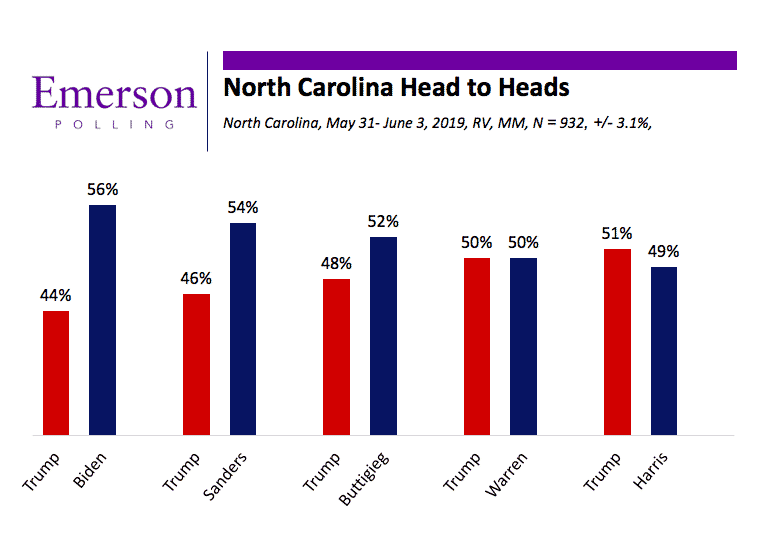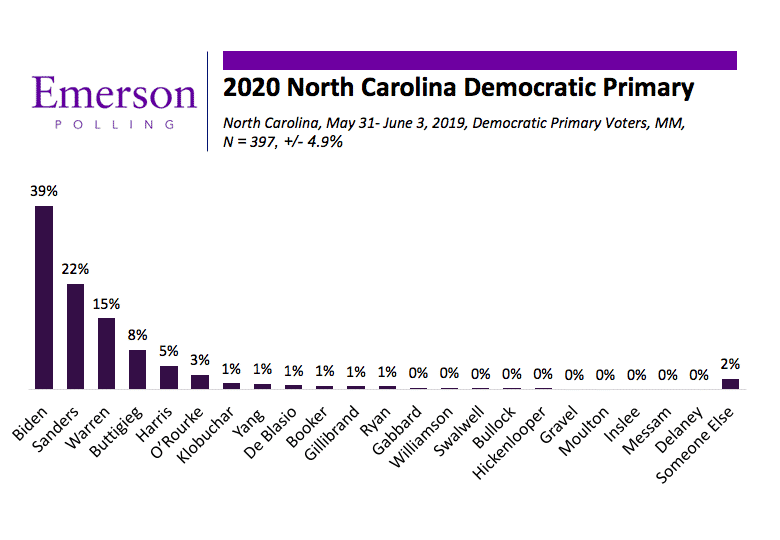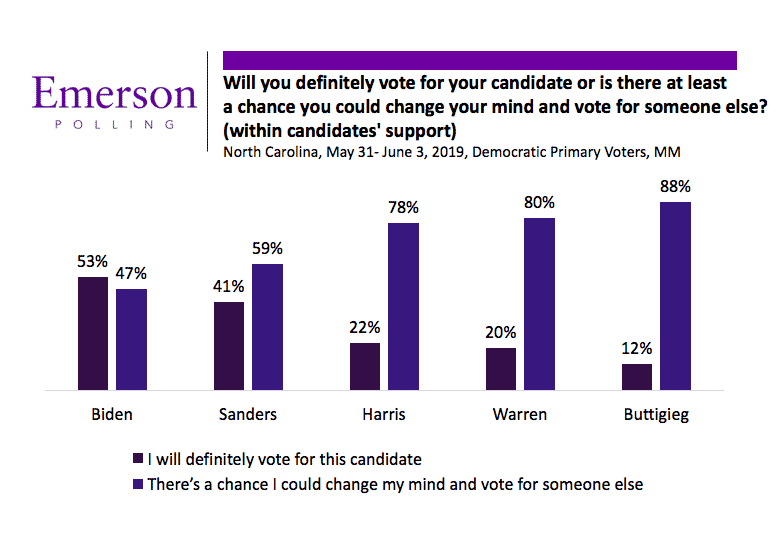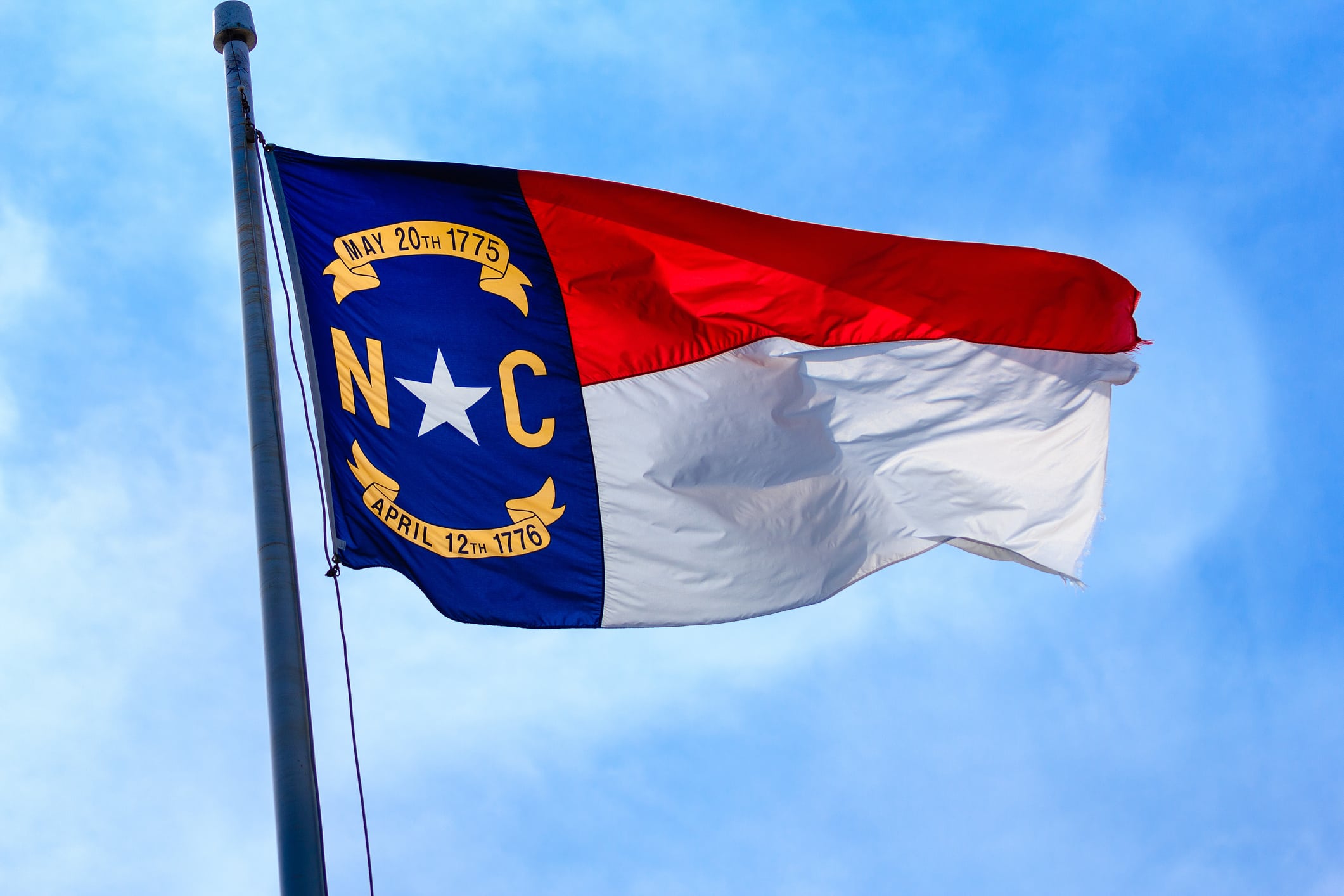A new Emerson Poll in North Carolina finds President Trump’s popularity underwater, with 52% disapproval and 41% approval (May 31-June 3, +/-3.1%). Trump received 50% of the vote to Clinton’s 46% in 2016, carrying the Tar Heel State and its 15 electoral votes. While the President remains popular within the Republican Party – Trump leads former Massachusetts Gov. Bill Weld 88% to 12%- the President is tied or trailing against four of the top five Democratic opponents, faring the worst against former Vice-President Joe Biden, who is ahead of Trump 56% to 44%.

In the Democratic primary, scheduled to be a part of Super Tuesday on March 3, 2020, former Vice President Joe Biden leads with 39%, followed by Sen. Bernie Sanders at 22% and Sen. Elizabeth Warren at 15%. Rounding out the top 5 are Mayor Pete Buttigieg at 8% and Sen. Kamala Harris at 5% (n=397, +/-4.9%).

Spencer Kimball, Director of Emerson Polling explained, “a trend of Biden and Sanders primary voters is beginning to emerge: among other variables, a Biden voter is more likely to be a registered Democrat as compared to the Sanders voter who is more likely to be Independent.” Kimball adds, “if this trend holds, those states that have closed primary/caucuses will present a distinct advantage for Biden, as Independents won’t be able to vote in those contests”.
Among those registered as Democrats, Biden leads Sanders 42% to 19%, but among Independent voters, Sanders leads Biden 34% to 26%. According to the NC Secretary of State office, about 37% of the state is registered as Democrat, and 32% are registered as unaffiliated (aka independent voters).
Biden leads among white voters with 29%, followed by Sanders at 25% and Warren at 20%. Yet, among African-American voters, Biden leads with 58% of the vote, followed by Sanders at 14% and Harris at 7%.
Sanders leads among 18-29 year olds with 38% of the vote, followed by Warren with 18% and Biden in third with 11%. Sanders and Biden are virtually tied 34% to 32% among 30-49 year olds, but with voters over 50, Biden leads Sanders 50% to 10%.
Among those with an annual household income below $50,000, Sanders leads with 40%, followed by Biden with 27% and Warren with 13%. Of those with an annual household income between $50,000 and $100,000 a year, Biden leads with 44%, followed by Warren with 15% and Sanders with 14%. Among voters with a household income over $100,000 a year, Biden also leads with 42%, followed by Warren with 21% and Buttigieg with 11%.
Democratic primary voters are still open to a different candidate, with 62% saying there’s a chance they could change their mind and vote for someone else. Among individual candidates, 53% of Biden voters and 41% of Sanders voters said they will definitely vote for those candidates. Conversely, 80% of Warren voters and 88% of Buttigieg voters said they could change their minds.

Issues
A plurality of voters, 32%, identify the economy as the single most important issue in deciding for whom they will vote for President. The economy is followed by healthcare at 18%, social issues at 14%, and immigration at 13%. Impeachment is the most important issue for only 4% of voters.
Among Democratic primary voters, healthcare (27%) and social issues (23%) are most important followed by the economy (16%) and the environment (14%). For Republican Primary voters, 46% said the economy, followed by immigration (24%) which was the only other issue in double digits. Among just general election voters economy (36%), healthcare (20%), immigration (10%) and the environment (8%) round out the top 4 issues.
Kimball explains “this data suggests that if the election comes down to issues, the Democratic Presidential candidate might have a more difficult time crafting a general election message, as both Republicans and Independents rank the economy as the most important issue, while Democratic voters rank it third behind healthcare and social issues”.
When asked about recent abortion legislation in the states of Alabama, Georgia, and Missouri, a majority of voters (56%) oppose North Carolina passing similar restrictions, with 32% supporting such legislation. 12% of voters are unsure on the subject. Republicans buck the trend with 56% in support of similar legislation, while 29% of Independents and 14% of Democrats support similar legislation. There is no difference based on gender.
On international relations, a majority of voters (51%) oppose sending troops to Iran, with 17% supporting sending troops, and 32% unsure on this issue. There is little support for troop intervention at the present time, with Democrats and Independents opposing sending troops by 6 to 1. Republicans are split, with 30% in support and 27% opposed, 42% are undecided on sending the troops to Iran question.
2020 National Convention Approval
Voters are generally in support of the 2020 Republican Convention being held in Charlotte, with 43% approval, 18% disapproval, and 38% unsure. While Republicans approve 72% to 5% and Independents approve 44% to 15%, Democrats disapprove 33% to 19%. Those in the 12th Congressional district, located in the city of Charlotte and surrounding areas, are the least excited region within the state about the convention: 41% disapproving and 28% approving of the location site.
In an Emerson poll in Wisconsin from March, voters were overall more supportive of the Democratic convention being held in the Badger state, with 59% approval and 16% disapproval. Hosting the convention had bipartisan support, with 35% of Republicans supporting and 29% opposing the convention being held in Wisconsin.
2020 Statewide Races
Republican Senator Thom Tillis appears to be in a vulnerable position facing re-election against potential Democratic Opponent, State Senator Erica Smith, who leads Tillis 46% to 39%, with 15% of voters undecided.
In the Governor’s race, the incumbent Democrat Roy Cooper leads his potential Republican opponent Lt. Governor Dan Forest, 52% to 38%, with 10% undecided.
Caller ID
The North Carolina Statewide Emerson College poll was conducted May 31-June 3, 2019 under the Supervision of Professor Spencer Kimball. The sample consisted of registered voters, n=932, with a Credibility Interval (CI) similar to a poll’s margin of error (MOE) of +/- 3.1 percentage points. The data was weighted by gender, party, ethnicity, education,region, and age based on 2016 voter model. It is important to remember that subsets based on gender, age, party breakdown, ethnicity and region carry with them higher margins of error, as the sample size is reduced. Data was collected using both an Interactive Voice Response (IVR) system of landlines only (n=527) and an online panel provided by Amazon Turk (n=405). Visit our website at www.emersonpolling.com.
Follow us on Twitter @EmersonPolling







